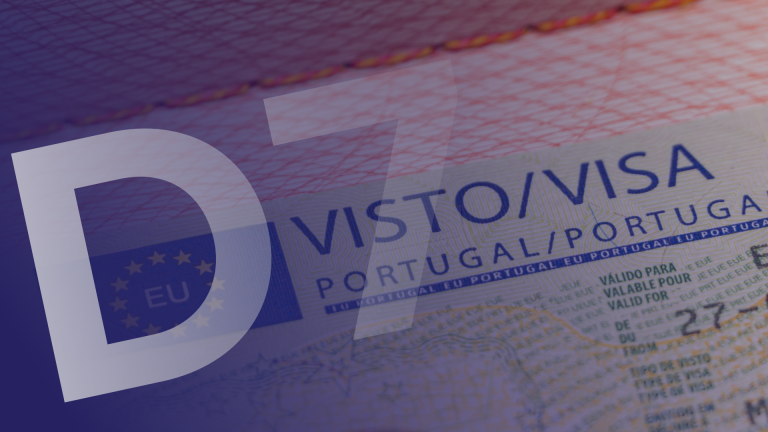
Do you want to retire or settle in Portugal without making a hefty amount of investment?
Then, the best option you have is the Portuguese D7 Passive Income Visa. Yes, you might have already heard about the Portuguese Golden Visa program, and D7 might sound new to you. But that is what can help you spend the rest of your life in the beautiful country of Portugal.
Nestling between the Atlantic Ocean and Spain, this country is loved by travelers from all over the world – all thanks to its combination of stunning modernity and rich history. People enjoy both Algarve's coastal charm and Lisbon's ancient streets.
Now, the question is, what is D7 Visa, and how can it help you reside in Portugal?
To answer all your questions about D7 Visa, we have provided a detailed guide about the same.
Read on.
- What is the D7 Visa?
In 2007, the Portuguese government introduced the D7 Visa. Some call it a Passive Income Visa, and some call it a Retirement Visa.
Whether you are an EEA, non-EU, or Swiss citizen, you can apply for this visa. Of course, you need to have a net regular passive income. This can be through income from rental properties, pensions, remote jobs, your own business, social security, savings, intellectual property, royalties, or investments.
- Terroso demands more from Byo Chiefs
- Terroso demands more from Byo Chiefs
- Failed pensioners regroup in litigation
- Vombo captures history of Zim in debut album
Keep Reading
This visa is great for entrepreneurs, investors, retirees, and pensioners who want to live in the gorgeous country of Portugal. Also, it is perfect for digital nomads, freelancers, remote workers, and crypto traders. All it requires is you to bring your own source of income to this country.
- What Are the Perks of Getting a D7 Visa in Portugal?
If you get a D7 visa or a retirement visa, you will get to enjoy a number of benefits. What are they?
Keep reading to know.
Visa-Free Travel
With D7 Visa, you can enter and travel visa-free through the Schengen Area.
Permanent Residency and Citizenship
After getting a D7 visa, you can avail yourself of a residence permit in Portugal. This will be valid for a year, after which you can renew it for two successive years.
Once you reside in Portugal for five years, you will be eligible to apply for permanent residency.
Family Reunification
Did you know that you can include your family members in the D7 visa program, too?
Once you have this visa, you can request family reunification in the Immigration and Borders Service (SEF). For this, all you need is to provide legal documents that can prove your relationship with the family members whom you want to add to this program. It can include:
- Your partner or spouse
- Your kids who are less than 18 years of age
- Your kids who are more than 18 years old, single, studying in some educational establishment, and dependent on you or your partner
- Your and your partner's parents, who are dependent on you
- Your siblings who are minor
Become an NHR Resident
There is a special tax program in Portugal called the non-habitual resident (NHR). With this program, you become eligible to pay very little or be exempt from taxes on your foreign source of income.
- What are the Income Requirements for a Portugal D7 Visa?
In order to get a D7 visa, you need to show that you have pensions or a minimum income for 12 months. The minimum amount is €8,460 for you. For your spouse, it will be 50% of this amount. And for each of your dependent kids, it will be 30% of this amount.
This minimum wage increases annually. It might be more when you are applying.
- What Are the Eligibility Criteria for D7 Visa in Portugal?
In order to get a Portugal D7 visa, you need to meet the following criteria:
- You have to be a citizen of a non-EU country
- You must not have any criminal record
- You should be able to spend a minimum of 16 months in Portugal during your first 2-year period
- You need to have a residence address in Portugal
- You should have sufficient funds to back your stay in Portugal
- What Is the Process for Getting a Portugal D7 Visa?
These are the following steps to get the D7 visa:
- You have to submit your application along with the documents required for a D7 visa from your home country. You will get your temporary D7 visa in about 60 days.
- Once you have your temporary D7 visa in hand, you need to make an appointment with the Portugal Immigration and Borders Service (SEF).
- You have to go for an interview with SEF and give them additional documents that are required.
- Finally, you get your D7 Residency Visa.
Conclusion:
The Portugal D7 visa can be a smart way for you to get into Portugal, especially if you are an investor and don't want to spend a lot of money. But for many people, the entire process of getting one can be a bit overwhelming. If you are one of them, you can take the help of investment migration experts. One such name is the Global Residence Index. If you want, you can learn more about the Portugal D7 visa on Global Residence Index. So, are you ready to make your Portugal dream a reality with a D7 visa?







